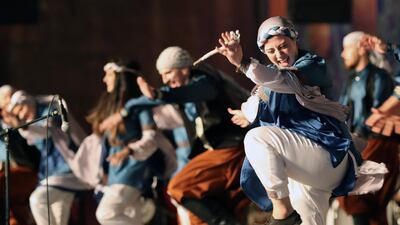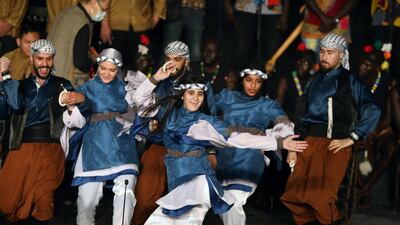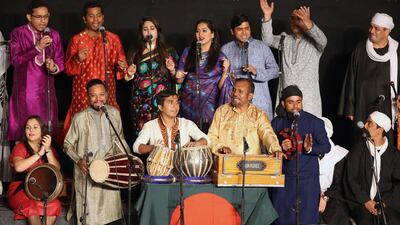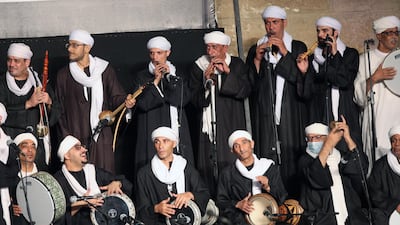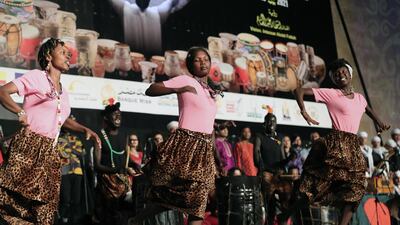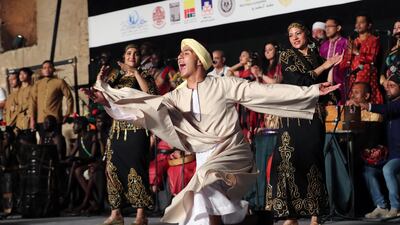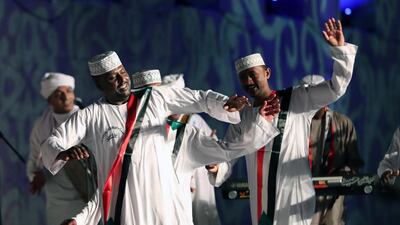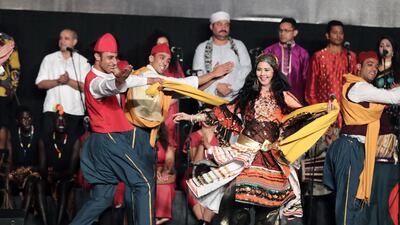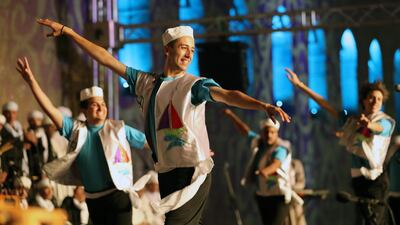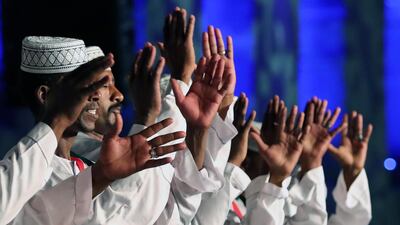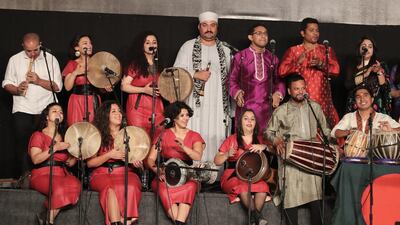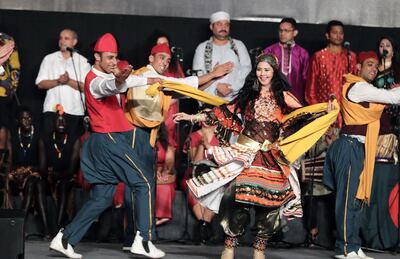This week, Cairo is hosting 30 folklore music groups that hail from 12 nations for the eighth iteration of the International Festival for Drums and Traditional Arts, which runs until Friday at several prominent cultural venues in the Egyptian capital.
The festival, which is an important staple of Cairo's events roster, was almost cancelled this year because of Covid-19 travel restrictions that prevented many of the guest performers from being able to attend. Egypt's Ministry of Culture is the organiser behind it.
The opening ceremony took place on Saturday night at the Citadel of Saladin in Old Cairo, and was attended by hundreds of music-lovers whose cheers could be heard outside the stone walls of the historic fortress.
For each iteration of the festival, a nation or two are chosen as the guest of honour, and this year Colombia and South Sudan were picked because of the prominence of percussion elements in their respective folkloric traditions.
"Our guest of honour every year are normally African nations because, when it comes to percussion, African music is unrivalled in its implementation of many different kinds of drums," festival director Siham Yousef tells The National.
The South American nation of Colombia also has a rich history of using percussive instruments in its traditional music, particularly among African-Colombian communities.
Aside from Egypt, which is well-represented this year, groups from Palestine, Syria, Colombia, the Philippines, Indonesia, Sudan, South Sudan, Bangladesh, Pakistan, Yemen and the Democratic Republic of the Congo are also participating.
While the festival’s focus is certainly on percussion, attendees have been delighted to hear a wide variety of other traditional instruments, such as the ney, the mizmar and the oud.
The theme of this year's event is Drums Dialogue for Peace, which festival founder Intesar Abdel Fattah explains was a deliberate juxtaposition with the traditional use of drums in war.
"It's funny, because drums were traditionally used to give soldiers a rhythm to march into battle to," says Abdel Fattah. "But in reality, drums are truly a beautifully peaceful addition to any music ensemble. This is what we wanted to focus on this year."
The Egyptian groups performing this year are markedly diverse, each hailing from a different corner of the country, bringing with them a unique folkloric tradition. From love songs to patriotic numbers, the variety of the performances is undeniable.
Groups from Palestine and Syria are also majorly featured this year in light of the solidarity many Egyptians feel with both nations.
Aside from the Saladin Citadel, there are performances taking place at the historic Beit El Sennari in Sayyida Zeinab, which was built in 1794 as the main residence of Ibrahim Katkhuda El Sennari, a Sudanese occultist. El Ghuri Dome and Amir Taz Palace will also be hosting performances for the duration of the festival.
“For the first time, we have chosen some of Cairo’s hidden cultural gems to host the groups this year,” says Yousef.
Entry is free of charge at any of the seven venues involved in the festival.
More on Quran memorisation:
The%20specs
%3Cp%3E%3Cstrong%3EEngine%3A%20%3C%2Fstrong%3E2.0-litre%204-cyl%20turbo%3Cbr%3E%3Cstrong%3EPower%3A%20%3C%2Fstrong%3E190hp%20at%205%2C600rpm%3Cbr%3E%3Cstrong%3ETorque%3A%20%3C%2Fstrong%3E320Nm%20at%201%2C500-4%2C000rpm%3Cbr%3E%3Cstrong%3ETransmission%3A%20%3C%2Fstrong%3E7-speed%20dual-clutch%20auto%3Cbr%3E%3Cstrong%3EFuel%20consumption%3A%20%3C%2Fstrong%3E10.9L%2F100km%3Cbr%3E%3Cstrong%3EPrice%3A%20%3C%2Fstrong%3EFrom%20Dh119%2C900%3Cbr%3E%3Cstrong%3EOn%20sale%3A%20%3C%2Fstrong%3ENow%3C%2Fp%3E%0A
THE BIO
Age: 30
Favourite book: The Power of Habit
Favourite quote: "The world is full of good people, if you cannot find one, be one"
Favourite exercise: The snatch
Favourite colour: Blue
The specs
Engine: 6.2-litre supercharged V8
Power: 712hp at 6,100rpm
Torque: 881Nm at 4,800rpm
Transmission: 8-speed auto
Fuel consumption: 19.6 l/100km
Price: Dh380,000
On sale: now
BMW M5 specs
Engine: 4.4-litre twin-turbo V-8 petrol enging with additional electric motor
Power: 727hp
Torque: 1,000Nm
Transmission: 8-speed auto
Fuel consumption: 10.6L/100km
On sale: Now
Price: From Dh650,000
Switching%20sides
%3Cp%3EMahika%20Gaur%20is%20the%20latest%20Dubai-raised%20athlete%20to%20attain%20top%20honours%20with%20another%20country.%0D%3C%2Fp%3E%0A%3Cp%3E%3Cstrong%3EVelimir%20Stjepanovic%20(Serbia%2C%20swimming)%20%3C%2Fstrong%3E%0D%3Cbr%3EBorn%20in%20Abu%20Dhabi%20and%20raised%20in%20Dubai%2C%20he%20finished%20sixth%20in%20the%20final%20of%20the%202012%20Olympic%20Games%20in%20London%20in%20the%20200m%20butterfly%20final.%20%0D%3C%2Fp%3E%0A%3Cp%3E%3Cstrong%3EJonny%20Macdonald%20(Scotland%2C%20rugby%20union)%20%3C%2Fstrong%3E%0D%3Cbr%3EBrought%20up%20in%20Abu%20Dhabi%20and%20represented%20the%20region%20in%20international%20rugby.%20When%20the%20Arabian%20Gulf%20team%20was%20broken%20up%20into%20its%20constituent%20nations%2C%20he%20opted%20to%20play%20for%20Scotland%20instead%2C%20and%20went%20to%20the%20Hong%20Kong%20Sevens.%20%0D%3C%2Fp%3E%0A%3Cp%3E%3Cstrong%3ESophie%20Shams%20(England%2C%20rugby%20union)%20%3C%2Fstrong%3E%0D%3Cbr%3EThe%20daughter%20of%20an%20English%20mother%20and%20Emirati%20father%2C%20Shams%20excelled%20at%20rugby%20in%20Dubai%2C%20then%20after%20attending%20university%20in%20the%20UK%20played%20for%20England%20at%20sevens.%20%0D%3C%2Fp%3E%0A
Company%20Profile
%3Cp%3E%3Cstrong%3EName%3A%20%3C%2Fstrong%3EDirect%20Debit%20System%3Cbr%3E%3Cstrong%3EStarted%3A%3C%2Fstrong%3E%20Sept%202017%3Cbr%3E%3Cstrong%3EBased%3A%3C%2Fstrong%3E%20UAE%20with%20a%20subsidiary%20in%20the%20UK%3Cbr%3E%3Cstrong%3EIndustry%3A%3C%2Fstrong%3E%20FinTech%3Cbr%3E%3Cstrong%3EFunding%3A%3C%2Fstrong%3E%20Undisclosed%3Cbr%3E%3Cstrong%3EInvestors%3A%3C%2Fstrong%3E%20Elaine%20Jones%3Cbr%3E%3Cstrong%3ENumber%20of%20employees%3A%3C%2Fstrong%3E%208%3Cbr%3E%3C%2Fp%3E%0A
WHAT IS A BLACK HOLE?
1. Black holes are objects whose gravity is so strong not even light can escape their pull
2. They can be created when massive stars collapse under their own weight
3. Large black holes can also be formed when smaller ones collide and merge
4. The biggest black holes lurk at the centre of many galaxies, including our own
5. Astronomers believe that when the universe was very young, black holes affected how galaxies formed
Cricket World Cup League Two
Teams
Oman, UAE, Namibia
Al Amerat, Muscat
Results
Oman beat UAE by five wickets
UAE beat Namibia by eight runs
Namibia beat Oman by 52 runs
UAE beat Namibia by eight wickets
Fixtures
Saturday January 11 - UAE v Oman
Sunday January 12 – Oman v Namibia
